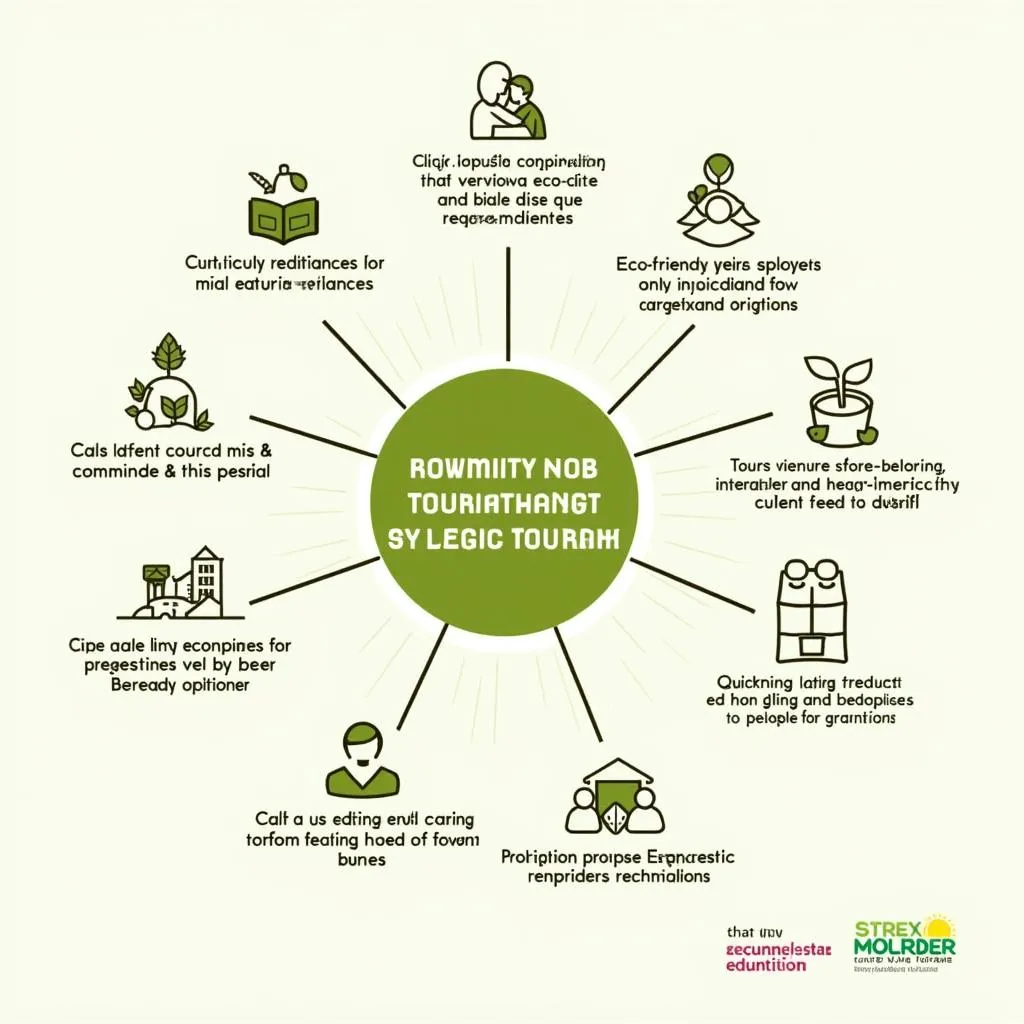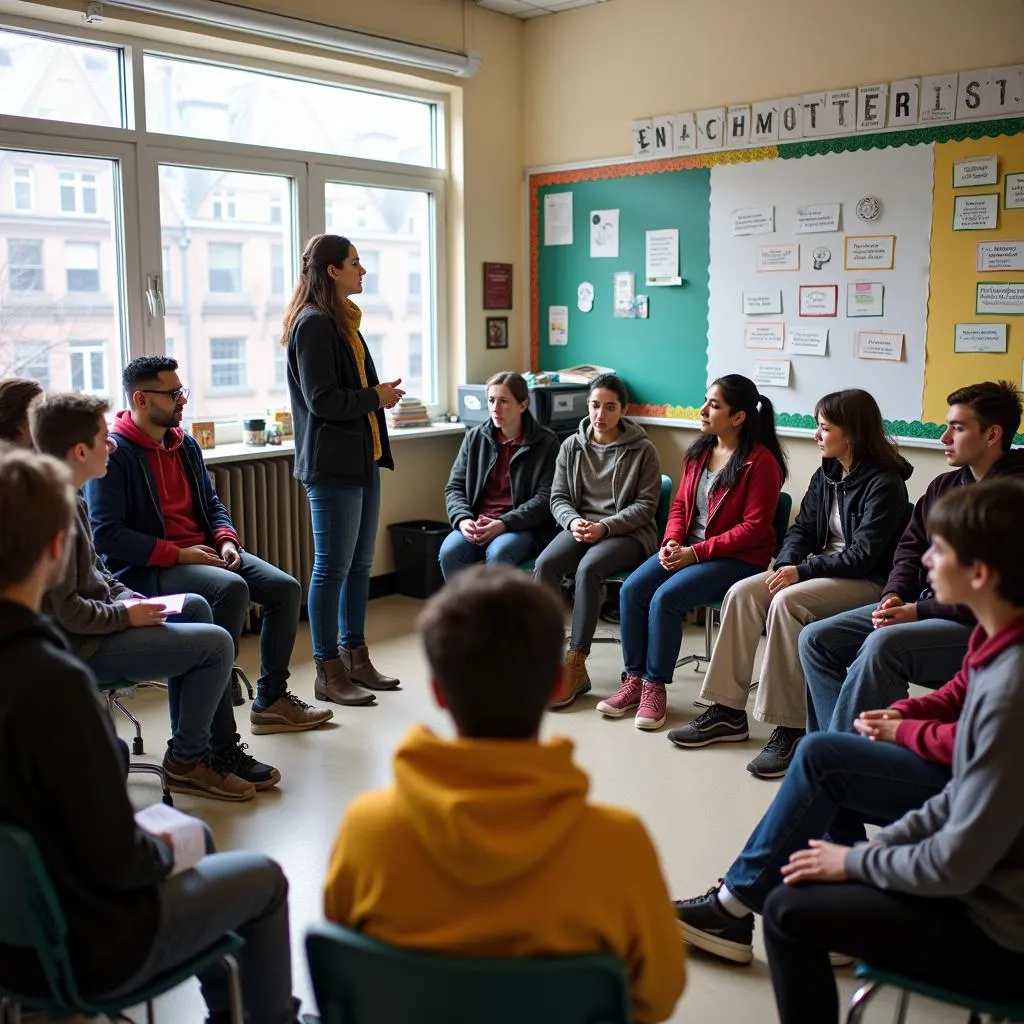The topic of “the influence of global tourism on preserving cultural heritage” is a recurring theme in IELTS Writing Task 2 essays. Based on analysis of past exam questions and current trends, this subject is likely to appear frequently in future tests. Its relevance to cultural preservation, economic development, and global interconnectedness makes it a prime candidate for IELTS essay prompts.
Nội dung bài viết
Let’s examine a sample question that closely resembles those seen in actual IELTS exams:
Some people believe that the growth of global tourism has had a negative impact on local cultures and traditions. Others argue that it helps preserve cultural heritage. Discuss both views and give your own opinion.
Analyzing the Question
This question requires candidates to:
- Discuss the negative impacts of global tourism on local cultures and traditions
- Explore how global tourism can help preserve cultural heritage
- Provide a personal opinion on the overall impact
It’s crucial to address all parts of the question and maintain a balanced approach while clearly stating your own viewpoint.
Sample Essays
Band 9 Essay Sample
The exponential growth of global tourism has sparked a debate about its impact on local cultures and traditions. While some argue that it erodes authentic cultural practices, others contend that it plays a vital role in preserving cultural heritage. In my opinion, the influence of global tourism on cultural preservation is largely positive, although it requires careful management to mitigate potential negative effects.
Those who view global tourism negatively often point to the commercialization of local cultures. Traditional rituals and customs may be modified or staged to cater to tourists’ expectations, potentially leading to a loss of authenticity. For instance, in some parts of Thailand, traditional long-neck tribes have become tourist attractions, raising concerns about the commodification of their culture. Moreover, the influx of visitors can lead to overcrowding at historical sites, potentially damaging fragile artifacts and structures.
However, the benefits of global tourism in preserving cultural heritage are substantial. Tourism provides economic incentives for communities to maintain their cultural practices and historical sites. The revenue generated from tourism often funds restoration projects and cultural programs that might otherwise be neglected due to lack of resources. For example, the income from visitors to Angkor Wat in Cambodia has enabled extensive restoration work, ensuring the preservation of this ancient wonder for future generations. Additionally, global tourism fosters cultural exchange and understanding, encouraging local communities to take pride in their heritage and actively work to preserve it.
In my view, the positive impacts of global tourism on cultural preservation outweigh the negatives. While the risk of commercialization is real, the economic benefits and increased global awareness of diverse cultures contribute significantly to the protection of cultural heritage. To maximize the positive effects, it is essential to implement sustainable tourism practices that respect local traditions and involve community members in decision-making processes.
In conclusion, global tourism, when managed responsibly, can be a powerful force for cultural preservation. By balancing economic benefits with respect for local traditions, we can ensure that tourism continues to play a vital role in safeguarding the world’s rich cultural heritage for future generations.
(Word count: 339)
 Global tourism's impact on cultural preservation
Global tourism's impact on cultural preservation
Band 7 Essay Sample
The growth of global tourism has sparked debates about its impact on local cultures and traditions. While some people believe it has negative consequences, others argue that it helps preserve cultural heritage. In my opinion, global tourism has both positive and negative effects on local cultures, but overall, it can be beneficial if managed properly.
On the one hand, critics argue that global tourism can harm local cultures. Mass tourism often leads to the commercialization of traditional practices, where authentic rituals are modified to appeal to tourists. For example, in some Pacific islands, traditional dances have been shortened and altered to fit tour schedules, potentially losing their original meaning. Additionally, the influx of tourists can overwhelm local communities, leading to a loss of privacy and disruption of daily life.
On the other hand, global tourism can play a crucial role in preserving cultural heritage. The economic benefits of tourism provide incentives for communities to maintain their traditions and historical sites. Many cultural landmarks and practices might be lost without the financial support generated by tourism. For instance, the restoration of ancient temples in Cambodia has been largely funded by tourism revenue. Moreover, tourism can increase awareness and appreciation of diverse cultures, encouraging both locals and visitors to value and protect cultural heritage.
In my view, while there are potential downsides to global tourism, its benefits to cultural preservation outweigh the negatives. However, it is important to implement sustainable tourism practices that respect local traditions and involve community members in decision-making processes. This approach can help minimize negative impacts while maximizing the positive contributions of tourism to cultural preservation.
In conclusion, global tourism has the potential to both harm and help preserve local cultures and traditions. By carefully managing tourism development and prioritizing cultural authenticity, we can harness its power as a tool for preserving and celebrating the world’s diverse cultural heritage.
(Word count: 309)
Band 6 Essay Sample
Global tourism has become very popular in recent years, and people have different opinions about how it affects local cultures and traditions. Some think it’s bad for preserving culture, while others believe it helps. I think global tourism has both good and bad effects on local cultures.
First, global tourism can have negative impacts on local cultures. When many tourists visit a place, sometimes the local people change their traditions to make tourists happy. For example, in some places, traditional festivals become more like shows for tourists, and they might lose their original meaning. Also, too many tourists can damage historical places or change the way local people live their normal lives.
However, global tourism can also help preserve cultural heritage. When tourists come to see local cultures, it can make local people proud of their traditions. This might encourage them to keep their customs alive. Also, the money from tourism can help pay for fixing old buildings or keeping traditional arts alive. For instance, in many countries, money from tourism helps to protect important historical sites.
In my opinion, global tourism can be good for preserving culture if it’s done in the right way. It’s important to find a balance between welcoming tourists and keeping local traditions authentic. Local communities should be involved in making decisions about tourism in their area.
To conclude, global tourism has both positive and negative effects on local cultures and traditions. If managed well, it can help preserve cultural heritage while also bringing economic benefits to local communities.
(Word count: 258)
 Cultural heritage preservation through tourism
Cultural heritage preservation through tourism
Explanation of Band Scores
Band 9 Essay Analysis
This essay demonstrates excellence in all four marking criteria:
- Task Response: The essay fully addresses all parts of the task, presenting a well-developed response with relevant, extended ideas.
- Coherence and Cohesion: Ideas are logically organized with clear progression throughout. Paragraphing is skillfully managed, and cohesive devices are used effectively.
- Lexical Resource: A wide range of vocabulary is used with very natural and sophisticated control of lexical features. Rare minor errors occur only as ‘slips’.
- Grammatical Range and Accuracy: A wide range of structures is used with full flexibility and accuracy. The essay maintains consistent control of complex language throughout.
Band 7 Essay Analysis
This essay shows a good command of English language skills:
- Task Response: The essay addresses all parts of the task, though some aspects are covered more thoroughly than others.
- Coherence and Cohesion: There is a clear overall progression, with appropriate use of cohesive devices. Paragraphing is generally well managed.
- Lexical Resource: A sufficient range of vocabulary is used to allow some flexibility and precision. There are occasional errors in word choice but they do not impede communication.
- Grammatical Range and Accuracy: A variety of complex structures is used with good control. Occasional errors occur but do not hinder overall clarity.
Band 6 Essay Analysis
This essay demonstrates a generally effective command of the language:
- Task Response: The essay addresses the task, though some points are underdeveloped.
- Coherence and Cohesion: Information and ideas are generally arranged coherently. Cohesive devices are used but may be repetitive or mechanical.
- Lexical Resource: An adequate range of vocabulary is used for the task. There may be some inaccuracies in word choice, but they do not significantly impede communication.
- Grammatical Range and Accuracy: A mix of simple and complex sentence forms is used. There are some errors in grammar and punctuation, but they rarely reduce communication.
Key Vocabulary to Remember
- cultural heritage (noun) /ˈkʌltʃərəl ˈherɪtɪdʒ/ – the legacy of physical artifacts and intangible attributes of a group or society
- preservation (noun) /ˌprezəˈveɪʃn/ – the act of maintaining or protecting something in its original state
- commercialization (noun) /kəˌmɜːʃəlaɪˈzeɪʃn/ – the process of managing or running something principally for financial gain
- authenticity (noun) /ˌɔːθenˈtɪsəti/ – the quality of being genuine or real
- commodification (noun) /kəˌmɒdɪfɪˈkeɪʃn/ – the transformation of goods, services, or ideas into commodities
- sustainable tourism (noun phrase) /səˈsteɪnəbl ˈtʊərɪzəm/ – tourism that respects both local people and the traveler, cultural heritage and the environment
- cultural exchange (noun phrase) /ˈkʌltʃərəl ɪksˈtʃeɪndʒ/ – the interchange of cultural practices between different groups
- overcrowding (noun) /ˌəʊvəˈkraʊdɪŋ/ – the state of having too many people or things in one place
- restoration (noun) /ˌrestəˈreɪʃn/ – the process of returning something to its original condition
- influx (noun) /ˈɪnflʌks/ – the arrival of large numbers of people or things
The influence of global media on local traditions can also have significant impacts on cultural preservation, similar to the effects of global tourism. Both phenomena contribute to the ongoing dialogue about balancing modernization with traditional values.
Conclusion
The topic of global tourism’s influence on cultural heritage preservation is likely to remain relevant in IELTS Writing Task 2 essays. To prepare effectively, practice writing essays on related themes such as:
- The role of technology in preserving cultural heritage
- Balancing economic development with cultural preservation
- The impact of globalization on local traditions
The role of art in expressing cultural identity is another fascinating aspect to consider when exploring the preservation of cultural heritage in the face of global influences.
Remember, the key to success in IELTS Writing Task 2 is to address all parts of the question, provide relevant examples, and express your ideas clearly and coherently. Practice writing essays on this topic and share them in the comments section below for feedback and further discussion. This active approach to learning will significantly improve your writing skills and prepare you for success in the IELTS exam.
 Sustainable tourism practices preserving culture
Sustainable tourism practices preserving culture
The role of cultural festivals in promoting social harmony is another important aspect to consider when discussing the preservation of cultural heritage. These events often serve as a bridge between traditional practices and modern tourism, offering opportunities for cultural exchange and preservation.
As you continue to explore this topic, consider how global tourism affects cultural preservation in different contexts and regions. This will help you develop a more nuanced understanding of the issue, enabling you to write more comprehensive and insightful essays.
Finally, when examining the effects of global tourism on cultural preservation, it’s important to consider both the immediate and long-term impacts. This broader perspective will allow you to craft more balanced and thoughtful responses in your IELTS essays.


